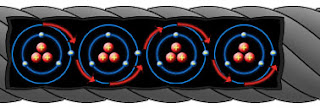Resistance is a kind of obstruction offered to the path of Current. And Current is the nothing but the flow of electrons.
Therefore it is the movement of electrons that matters, which means if a body has abundance of free electrons, we call it a good Conductor and if a body has no free electrons, we call it Insulators .
 |
| Electrons flowing through a conducting wire |
Therefore it is the movement of electrons that matters, which means if a body has abundance of free electrons, we call it a good Conductor and if a body has no free electrons, we call it Insulators .
Insulators has very high value of resistance.
Conductors has negligible resistance.
There are some more parameters on which resistance varies, they are :
- Cross-section Area of the conductor
- Length of the conductor
Resistance is directly proportional to the length of the conductor i.e. more the length of the conductor, more will be the resistance offered to the flow of the electrons, which means electrons have to travel longer distance, and with increase in distance obstructions increases as well.
NOTE: if you test resistances of same material of conducting wires varying only in the cross-sectional-area with a DIGITAL MUTIMETER, you will find that the wire with larger area offers less resistance, and the value on the multimeter will be lesser.
Similarly, you can also test two conducting wires of same material but of varying length this time, you will find that the resistance offered by the longer wire is far more than that of shorter one.
As every quantity we use in our daily life has got units, Resistance has units of Ohm i.e. it is measured in Ohms.
Omega(Ω) is its symbol.
1KΩ = 1000 Ω
1MΩ = 1,000,000 Ω
Its unit Ohm is named after its discoverer, whose name is Georg Simon Ohm, He was born in Bavaria(now in Germany) in 1787.
 |
| See Bavaria in Map of Germany |
Ohm was able to demonstrate in 1827 that the electrical resistance of a conductor such as copper varied in proportion with its area of cross-section, and the current flowing through it is proportional to the voltage applied to
it, as long as temperature is held constant. Fourteen years later, the Royal Society in London finally recognized
the significance of his contribution and awarded him the Copley Medal.
Today, his discovery is known as Ohm’s Law.
 |
| Gerog Simon Ohm |







